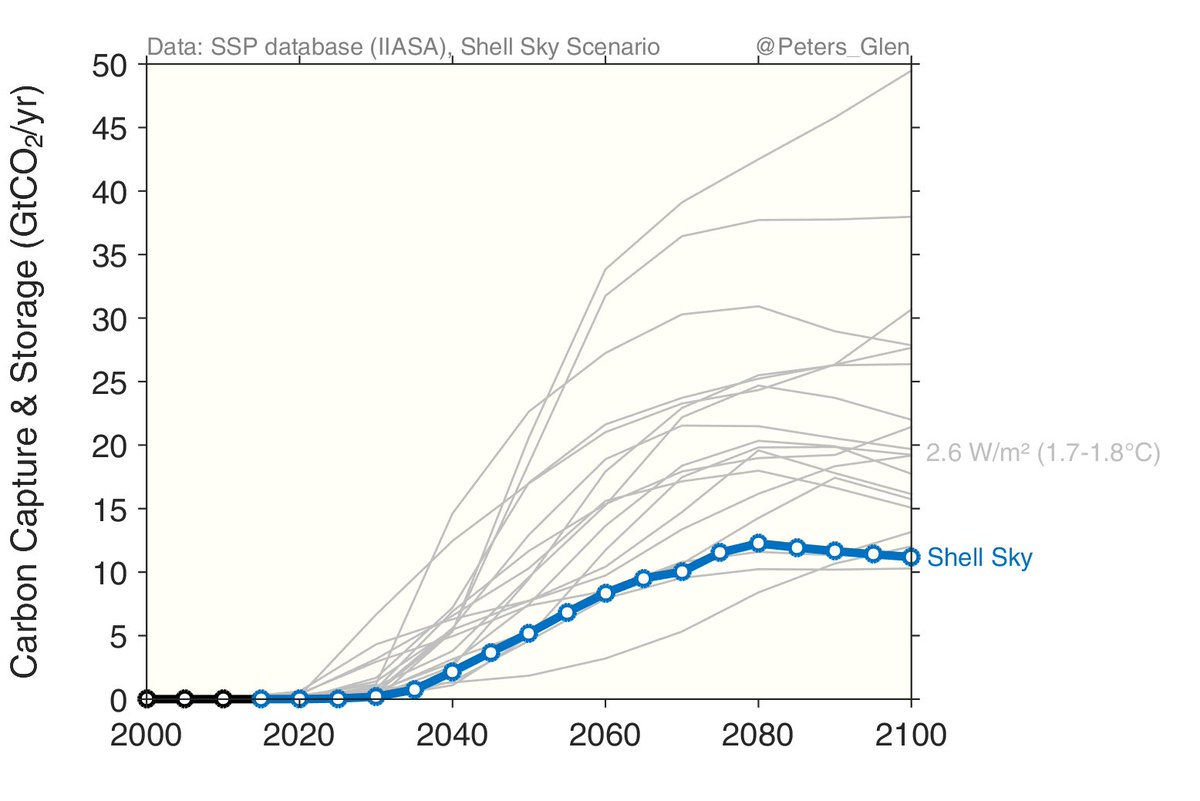
1. "Take the example of Shell"
Shell has a "well below 2°C" scenario, but it does this by maintaining high fossil fuel use...
"this logic appears fully internalized in mainstream climate scenarios"
Quotes are from @wim_carton, but thread is based on:
cicero.oslo.no/no/posts/cicer…
Shell has a "well below 2°C" scenario, but it does this by maintaining high fossil fuel use...
"this logic appears fully internalized in mainstream climate scenarios"
Quotes are from @wim_carton, but thread is based on:
cicero.oslo.no/no/posts/cicer…
2. I looked into how Shell compares to mainstream scenarios in 2017.
Compared to the quantified Shared Socioeconomic Pathways (SSPs, in grey), Shell uses a lot of energy, but the CO₂ emissions are well within the range of mainstream <2°C scenarios RCP2.6.
Compared to the quantified Shared Socioeconomic Pathways (SSPs, in grey), Shell uses a lot of energy, but the CO₂ emissions are well within the range of mainstream <2°C scenarios RCP2.6.

3. As @wim_carton documents in his paper, Shell uses quite a bit of fossil fuels. A bit more coal than in the average SSP, gas a bit less, oil sort of an average with others with a long tail.
How is it possible to use so much fossil fuel & hit net-zero CO₂ emissions?
How is it possible to use so much fossil fuel & hit net-zero CO₂ emissions?

4. While Shell was high on fossil fuels, the Shell Sky scenario was also quite aggressive on renewables! Wind & solar, in particular, were much higher than most mainstream scenarios. This probably got Shell a lot more attention. 

5. Shell Sky gets to "well below 2°C" using lots of fossil fuels, by does this by using lots of carbon dioxide removal (bioenergy with CCS for negative emissions) & afforestation.
Shell uses a mind-boggling amounts, but Shell uses *less* than many mainstream scenarios.
Shell uses a mind-boggling amounts, but Shell uses *less* than many mainstream scenarios.

6. "More surprising is the fact that [high fossil fuel use] appears fully internalized in mainstream climate scenarios, ... IPCC reports appear to feature emission reduction pathways that seem fully compatible with massive continued fossil fuel use in the medium term" @wim_carton
7/7. @wim_carton makes a nice entry point to the discussion of why mainstream scenarios use so much fossil fuels to stay "well below 2°C".
Read the article to see why...
Pre-print (free): researchgate.net/publication/34…
Published: rutgersuniversitypress.org/has-it-come-to…
Read the article to see why...
Pre-print (free): researchgate.net/publication/34…
Published: rutgersuniversitypress.org/has-it-come-to…
• • •
Missing some Tweet in this thread? You can try to
force a refresh













